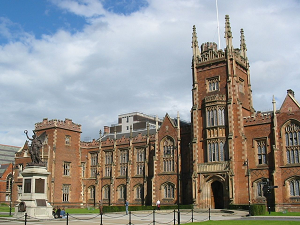
By Jonathan McCambridge, PA
A new international consortium to uncover genes that lead to breast cancer in men has been launched at Queens University in Belfast.
The consortium, known as MERGE, will discover and characterise new genetic risk factors for male breast cancer by analysing DNA from 5,000 men.
The DNA will be compared to that of 10,000 men without breast cancer, making it the largest study of its kind worldwide.
A new international consortium to uncover genes that lead to breast cancer in men has been launched at Queens University in Belfast.https://t.co/ndGT7xrg6e
— Q Radio News (@qnewsdesk) April 13, 2022
The team aims to develop a better understanding of the causes of breast cancer in men that may lead to new treatments for the disease.
Lead researcher, Dr Nick Orr from the Patrick G Johnson Centre for Cancer Research, said:
“We need to develop a better understanding of breast cancer in men in order to improve prevention, early detection and treatment.
“Having access to the large resource provided by the MERGE consortium will enable us to develop a deeper insight into the genetics and pathology of this rare disease.”
Male breast cancer is a relatively rare disease that accounts for less than 1% of breast cancers diagnosed every year in the UK, equating to 400 new cases annually.
The initiative is led by Queens and Sapienza University of Rome and supported by the US National Cancer Institute.
Dr Kyle Thompson, from Queens who is also working on the project, added:
“Over the three-year project, we aim to fully analyse DNA from 5000 men with breast cancer.
“By comparing the genomes of men with breast cancer to those of healthy men, we hope to identify new genetic variants that cause the disease.
“This knowledge could help to identify men at risk of developing breast cancer.”
Dr Orr added: “It is only through international collaborations such as ours that we will be better equipped to treat this rare type of cancer.
“We will share the data gathered with our research groups, working together to make real progress in this area.
“We also hope that this work will increase the visibility of male breast cancer and educate men about the risks, encouraging them to see their doctor if they have concerns about their health.”
Professor Laura Ottini, from Sapienza University of Rome and co-lead researcher, said:
“From our experience in male breast cancer research, we know how collaborative multidisciplinary efforts lead to increased understanding in the medical and scientific communities as well as the dissemination of information and awareness to the public.
“In this context, MERGE will provide a great opportunity for filling the knowledge gap concerning male breast cancer genetics and address unmet clinical need toward gender-specific risk prediction assessment.”



 O’Neill ‘did not see ex-press officer McMonagle at Stormont event’
O’Neill ‘did not see ex-press officer McMonagle at Stormont event’
 Majority of teachers reject pay offer for second time
Majority of teachers reject pay offer for second time
 Police investigate ‘racially motivated hate crime’ in west Belfast
Police investigate ‘racially motivated hate crime’ in west Belfast
 Woman stabbed partner as he slept in ‘premeditated’ murder, court told
Woman stabbed partner as he slept in ‘premeditated’ murder, court told
 Police make new appeal over missing man last seen in October
Police make new appeal over missing man last seen in October